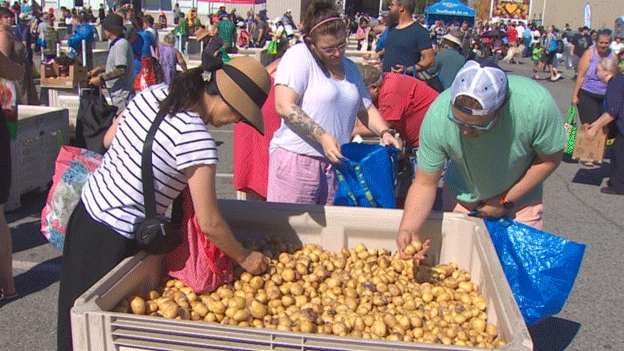On a recent Saturday, approximately 10,000 people gathered at the Cloverdale Rodeo Fairgrounds for the latest edition of Ugly Potato Day. The event, which started two years ago on the Heppell family’s farm, offers deformed, bruised, and blemished vegetables that would otherwise be discarded or fed to livestock. Tyler Heppell, the founder of the event, emphasizes that these vegetables are still nutritious and safe to eat.
“Our goal is to ensure that these vegetables end up in people’s bellies rather than being wasted,” Heppell explains. By providing free vegetables to the community, the event addresses two critical issues: food insecurity and food waste.
A Community-Focused Approach
The popularity of Ugly Potato Day has surged, prompting the City of Surrey to provide the larger Cloverdale Rodeo Fairgrounds as the venue. This year, the event saw a staggering 150,000 pounds of vegetables and other food items distributed, thanks to the support of the Greater Vancouver Food Bank and numerous local farms.
Cynthia Boulter, the chief operating officer of the Greater Vancouver Food Bank, highlights the increasing need for such initiatives. “With the rising cost of living, many people are struggling to make ends meet. Events like Ugly Potato Day are crucial for those who can’t afford vegetables otherwise,” Boulter says.
Raising Awareness and Expanding Impact
Beyond addressing immediate food needs, Ugly Potato Day also serves to educate local farmers about B.C.’s food donation tax credit. This incentive provides farmers with non-refundable tax credits equivalent to 25% of the fair market value of donated food. Despite this benefit, many farmers remain unaware of the tax credits or the logistics involved in donating imperfect produce.
Heppell acknowledges the logistical challenges faced by farmers. “Managing the distribution of 150,000 pounds of vegetables is no small feat,” he notes. “Many farmers don’t have the time or resources to deal with surplus produce effectively.”
To tackle these issues, Heppell plans to broaden the initiative. He is collaborating with farms across Canada to organize similar “Ugly Produce Days,” with the ambitious goal of extending the program nationwide.
Ugly Potato Day exemplifies how grassroots efforts can make a significant impact on both food security and environmental sustainability. By turning visually imperfect vegetables into valuable resources for the community, this initiative not only helps those in need but also reduces food waste. As the event’s popularity grows, its model could inspire similar efforts across Canada and beyond, showcasing the power of community-driven solutions in addressing global challenges.





